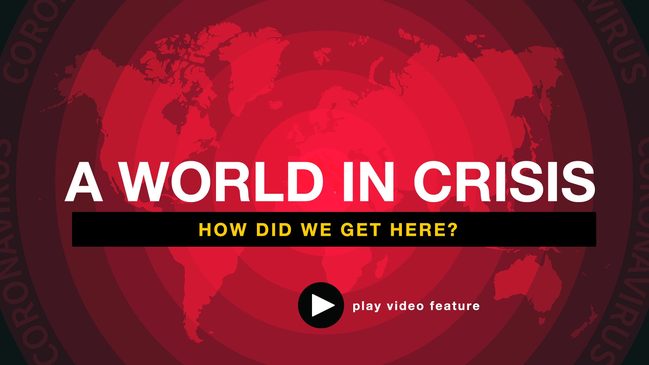COVID-19: Virus delivers $60b blow to Aussie economy
The true cost to Australian businesses and families has been revealed as defence experts warn China is “weaponising” the coronavirus for its strategic advantage.

Coronavirus
Don't miss out on the headlines from Coronavirus. Followed categories will be added to My News.
- Deadly impact of China’s COVID-19 cover-up
- Scientists linked to COVID probe studied live bats in Australia
Exclusive: The lost income from Australian families and businesses as a result of the coronavirus pandemic will total $60 billion in the next few months, according to new economic modelling.
The devastation to the Australian economy comes as defence experts warn China is “weaponising” the coronavirus for its strategic advantage and threatening even further economic retaliation to shut down inquiries into the origins of the virus outbreak.
New Deloitte Access Economics modelling to be released today predicts lost wages and profits to families and businesses in Australia will total $60 billion in the four months from the start of April.
The accommodation and food services sector is expected to take the biggest body blow of $8.1 billion in lost income. Arts and recreation is the sector next hardest hit with $6.4 billion of losses followed by $3.1 billion from rental and real estate.
Deloitte Access Economics economist Emma Grey said the deeper the lockdowns, the deeper the income losses would be and warned that if restrictions were not lifted, the economic pain for families would grow.
“We are assuming that the economy starts bouncing back in September so if restrictions stay as they are until then the hit to families and business will be substantially worse than the $60 billion estimate,” she said.
Surprisingly, construction and healthcare sectors will also suffer with a hit of $5 billion and $2.5 respectively.
“Governments, federal, state and local, are trying hard to speed up or add to the construction projects that they’re financing, but a bunch of private sector projects are slowing and some projects are being put on hold as businesses reassess the need to build,” Ms Grey said.
Healthcare, meanwhile, was not booming despite the medical pandemic.
“Some would expect that healthcare as a sector had benefited but it’s a lot more than just hospitals,” Ms Grey said.
“Given so much of that sector is based on working in close proximity to other people, the non-essential parts of healthcare have had to shut down.”
But the retail sector was holding-up better than anticipated with only an expected drop of $3 billion in lost income and profits in the months ahead.
“The main thing with retail is while the department stores and shopping malls have all had to shutdown, we’ve all experienced for ourselves that online shopping has spiked up massively,” she said.
“Australia Post is dealing with the same volumes they deal with at Christmas but over an extended period of time, so retail hasn’t been hit as hard as we might have expected.”
Former Defence Department Deputy Secretary for Strategy and current Australian Strategic Policy Institute executive director, Peter Jennings, said China’s actions since the outbreak had shown it was taking advantage of the economic and health devastation around the world.
“Whilst the origins of the virus is unclear, what’s very clear is that China is trying to weaponise the virus now,” he said.
“It’s using it strategically to try to gain advantage for itself. It had a headstart to deal with it. Whilst they might not have planned it this way they are trying to get the most advantage out of it now.”
Part of China’s advantage is the economic pummelling its western counterparts are coping, Mr Jennings said.
“Certainly globally I think this will be seen on a par with the great depression in terms of the global economic impact,” he said.
And now that countries are suffering, Mr Jennings said China’s move was “to use economic levers to try to force different behaviour from other countries.”
“We’ve see here that China is threatening economic retaliation. It’s almost like China has given up on the idea of diplomacy,” he said.
A Morrison Government minister said Australia will reassess its relationship with China moving forward.
“From an Australian perspective, I think the virus changes our questioning of their influence. It’s been a sobering experience,” the minister said.
It’s a point many politicians agree with.
“Australia needs to fundamentally reset our relationship with China,” Victorian Senator James Paterson said.
“We have become too dependent on them and too deferential towards them.
“We must be more forthright in publicly standing up for our values, national interest and sovereignty. In the post-coronavirus world the relationship needs to be on more equal footing.”
Originally published as COVID-19: Virus delivers $60b blow to Aussie economy


